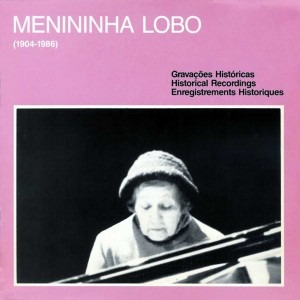
artist: — Menininha Lobo
title: — Menininha Lobo (1904-1986)
date: — Nov. 1980, Nov. 1981, rereleased as 3CD set in 1991
sample: — Bach/Hess: Jesus Joy of Man’s Desiring
CD 1: Music by Bach, Mozart, Beethoven, Schumann, Strauss/Pfeifer
CD 2: Music by Chopin, Franck/Bauer, Fauré, Poulenc
CD 3: Music by Debussy.
Liner Notes:
Menininha Lobo
Arthur Rubinstein, in his memoirs, recalls that in São Paulo, after World War I, he met “two brilliant pianists, Antonietta Rudge (1885-1974) and Guiomar Novaes (1895-1979)” and that both were pupils of Luigi Chiaffarelli (1856-1923), “a great piano teacher whose fame attracted even pupils from abroad [and who] was considered the equal of Isidor Philipp or Busoni,” Menininha Lobo did not come from abroad, but from nearby Campinas to study with the important master. Chiaffarelli called her “the pupil of my musical eyes.”
Granddaughter of the composer Elias Lobo and the youngest of nine children, Guilhermina de Freitas Lobo was born on September 9, 1904 in Campinas. She was tiny and frail, and was nicknamed Menininha which, in Portuguese, means “little girl.”
She started her piano studies with her sister Anna Esméria and then studied with Alfredo Oswald (son of composer Henrique Oswald), Luigi Chiaffarelli, and his assistants Antonietta Rudge and Maria Edul Tapajós. Suffering from cramps in her right arm, she went to Germany for treatment and there studied with Frau Posener, an assistant of Schnabel’s, who had overcome the same problem. Upon her return to Brazil, she became an assistant to Magda Tagliaferro.
Menininha Lobo’s technique is limpid and flexible, making the music seem to spring from her fingers. Her tone is crystal clear, her legato perfect, her pedaling, subtle. Playing in an orchestral manner with several levels of sonority, she brings out the melody, inner lines, and bass line. Her awareness of the harmonic motion makes the music sound improvised and the flow of the musical line is maintained by her impeccable rhythm. She is a romantic pianist without the mannerisms of the romantic school. Her phrasing is natural. Her interpretations are narrative, spontaneous, personal, yet highly organized; they are intense, but of a disarming simplicity, full of sentiment without sentimentality. Her repertoire includes works of Bach, Mozart, Beethoven, Schumann, Chopin, Franck, Fauré, Debussy, and Poulenc.
Although she has appeared in Brazil, Uruguay, Argentina, and has always been admired by musicians and aficionados, her public performances have been infrequent. Her modesty and frailty prevented the development of a major career. She has been unable to practice with regularity since an automobile accident in 1974. With profound knowledge of her métier and of her present limitations, she declined offers to perform in New York.
A religious woman, she wanted to record on Saint Cecilia’s Day (the patron Saint of musicians). She considers her musicality a gift from God, adding “I even thought that God did not like my music very much, because He gave me so many difficulties to realize it, but He is always merciful.”
Humble before music, honest and sincere, she dedicated her life to her art.
Menininha Lobo, physically like Edith Piaf, emotionally like Emily Dickinson, is not only a legendary figure, a precious treasure of the past: she is a musician for connoisseurs, one of the glories of Brazilian pianism.
©William Daghlian
New York, November 1980
Menininha Lobo died in 1986. These recordings are classics of Brazilian discography.